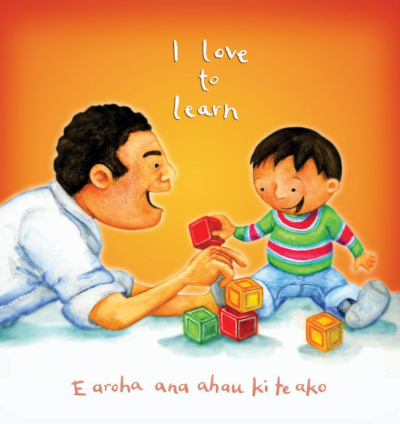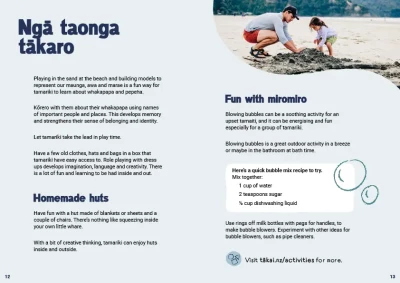
Learning through pretend play
Pretend play is an important learning activity for children. Parents can join in and model the sorts of behaviours they want their child to follow.
At this stage, a child will enjoy pretend play with parents, friends and even themselves. Pretend play helps children express ideas, feelings and relationships. By imitating caregivers, they are starting to develop their imagination and capacity for empathy.
Copying speech and mannerisms
Surprisingly, parents can sometimes be shocked to hear their child using their tone of voice or their phrases. A child may take on an adult’s pose and attitude while pretending to talk on the phone. Or parents may overhear their child talking to a doll in the same way they speak to them. This is a strong reminder that children are watching us and learning from us all the time.
Gentle nurturing care, using manners and being friendly – in fact any behaviour that whānau want their child to learn – can be modelled through pretend play.
Dressing up
Look at page 12 of Whakatipu Te Kōhuri 3 with the whānau – Ngā taonga tākaro.
‘Have a few old clothes, hats and bags in a box that tamariki have easy access to. Role playing with dress ups develops imagination, language and creativity. There is a lot of fun and learning to be had inside and out.’
Here are some ideas the whānau might want to try.
- Join their child in their play – taking the child’s lead and remembering not to take over.
- Collect props that help children take on roles, for example, office odds and ends, grocery containers, coupons and play money, as well as hats, bags, shoes and clothes for dress ups.
- Make simple masks using paper bags – a safe child-height mirror adds enjoyment too.
- Are there ways you might enter into your child’s play and introduce topics that have been worrying them, for example, practising going to the hospital, moving house or welcoming a new baby?
Symbolism
There is a strong relationship between pretend play and learning language. They both use symbolism, where one thing can stand for another thing. In pretend play, we might use a blanket for a tent house, and in language, our words stand for our thoughts, ideas and feelings.
Pretend play helps children learn to use symbols. We can also introduce less commonly used words during pretend play, like ‘rescue’, ‘castle’ or ‘pirate’.
Benefits of pretend play
Pretend play with a child can help them:
- learn about playing with others
- imagine what it’s like to be another person – which is important for developing empathy
- have fun and have lots to talk about
- make stories come alive by acting out the characters.
Play is a rehearsal for the challenges and ambiguities of life.
National Geographic, December 1994
Try an activity
Play sock puppets
Puppets are great way for our children to use their imagination
Conversation ideas
Helpful resources for whānau
-
Family and dramatic play
Ministry of Education
New Zealand-based early childhood education information on the value of pretend play for preschoolers.













